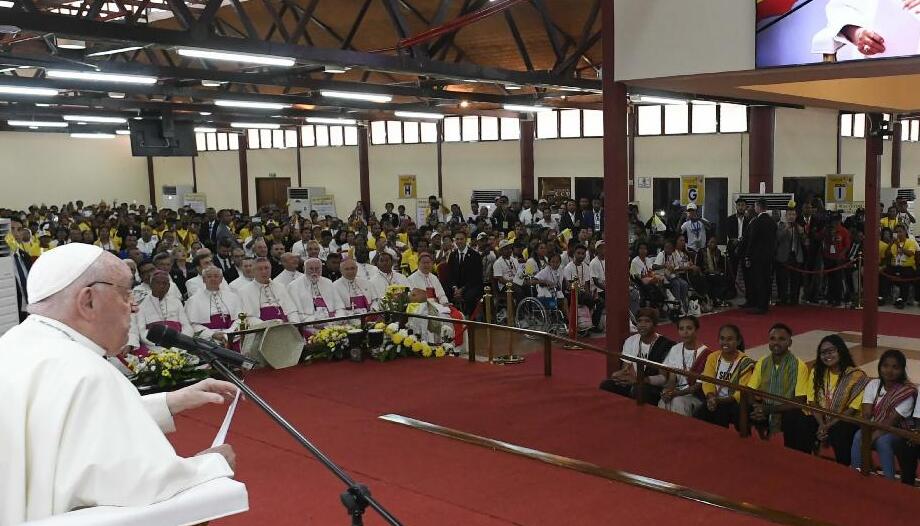The Pope began Wednesday's catechesis at the General Audience with an engaged couple, noting, "It is beautiful to see when love leads forward to make a new family, like these two young people."
The scene ties in completely with one of the events that most moved the Pope during his recent trip to Asia and Oceania. In taking stock of his stay in East Timor, he said: "I was struck by the beauty of that people, a people tested but joyful, a people wise in suffering, which generates many children, and teaches them to smile. The smile of the children of that region. They always smile, and there are many of them. With faith they are taught to smile. And this is a guarantee for the future. On East Timor I saw the youth of the Church, families, children, young people. I breathed spring air".
"Today I speak to you about the journey to Asia and Oceania, a journey to bring the Gospel, to get to know the soul of the people," he said. "I thank the Lord who has allowed me to do as Pope what I could not do as a young Jesuit." This is how Francis began his catechesis today, based on the end of the Gospel of St. Matthew, when, before ascending to heaven, the Lord says to the eleven disciples: "Go therefore and make disciples of all nations, baptizing them in the name of the Father and of the Son and of the Holy Spirit".
Living and young church
"It was Paul VI in 1970 who was the first Pope to fly to meet the rising Sun," the Pope recalled. "That was a memorable trip. A few years older than him, I limited myself to four countries, Indonesia, Papua New Guinea, East Timor and Singapore."
"The first reflection that arises spontaneously is that in thinking about the Church we are still too Eurocentric, or as they say, Western. In reality, the Church is much bigger, and also much more alive. I have experienced this with emotion when I met these communities, listening to the testimonies of priests, lay people, especially catechists...".
"In Indonesia I found a living Church, although Christians are 10 percent, and Catholics 3 percent. able to live and transmit the Gospel, in a country with a very noble culture, prone to harmonize diversity, and which has the largest presence of Muslims in the world."
Compassion and fraternity for the future
"In that country," he continued, "I was able to confirm that 'compassion is the path along which Christians can and must walk in order to bear witness to Christ' and at the same time meet with the great religious traditions. "Let us not forget the three characteristics of the Lord: closeness, mercy and compassion." "Faith, fraternity, compassion, was the motto of the visit to Indonesia. There I saw that fraternity is the future.
In Papua New Guinea "I found the beauty of a Church on the move, with different ethnic groups speaking more than 800 languages, an ideal environment for the Holy Spirit, the head of harmony. There, the protagonists in a special way are the missionaries and the catechists. I was moved by the songs and music of the young people. There, the future comes without tribal violence, without dependence, without ideological and economic colonialism". "Papua New Guinea can be a laboratory of this model of integral development, animated by the leaven of the Gospel," the Pope noted.
East Timor, faith and culture, youth
"The human and social promotion power of the Christian message stands out in a particular way in the history of East Timor. There, the Church has shared the process of independence with all the people, always orienting it towards peace and reconciliation. This is not an ideologization of faith. It is faith that becomes culture, and at the same time enlightens, purifies and elevates it. That is why I relaunched the fruitful relationship between faith and culture, on which St. John Paul II had already focused during his visit" "Faith must be inculturated, Faith and culture".
I was impressed by the beauty of that people, a tested but joyful people, a people wise in suffering, which generates many children, and teaches them to smile. The smile of the children of that region. They always smile, and there are many of them. With faith they are taught to smile. And this is a guarantee for the future". "In East Timor I saw the youth of the Church, families, children, young people. I breathed the air of spring.
At SingaporeChristians are a minority, but they continue to form a living Church, committed to generating harmony and fraternity among the various ethnic groups, cultures and religions. I thank God for the gift of this trip".
"Children, the true wealth of a nation".
Addressing the Polish-speaking pilgrims, the Pope recalled the Jesuit novice, St. Stanislaus Kostka, patron saint of children and young people, who died at the age of 18, and then underlined the vitality of the local Churches he visited, which welcomed him "with so much love".
Before giving his blessing, the Holy Father insisted that "children are the true wealth of every nation, even here in Europe". He prayed for the victims of the heavy rains that have hit Central and Eastern Europe, causing deaths, missing persons and extensive damage; he asked for "prayers that medical science may soon offer prospects for a cure for Alzheimer's disease" (Saturday 21 is World Alzheimer's Day), and for support for the sick and their families, and prayed that the Lord will help us to overcome war and obtain peace.








